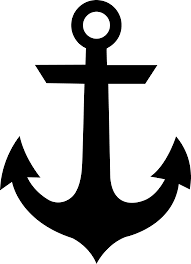anchor
英 [ˈæŋ.kər]
美 [ˈæŋ.kɚ]
- n. 锚;抛锚停泊;靠山;新闻节目主播
- vt. 抛锚;使固定;主持节目
- vi. 抛锚
- adj. 末棒的;最后一棒的
使用频率:

记忆方法
联想记忆法:想象一个“anchor”(锚)固定在海洋中的船体上,它稳固、可靠,就像“anchor”在句子中起到稳定或固定作用一样。通过这样的视觉联想,可以帮助记忆单词“anchor”的含义。
以上内容由AI生成, 仅供参考和借鉴
中文词源
anchor 抛锚
同ankle, 弯钩,脚踝,锚。
英语词源
- anchor
-
anchor: [OE] English borrowed this word from Latin in the 9th century, but its ultimate source is Greek ágkūra (which goes back to an Indo- European base *angg- ‘bent’, also the source of angle and ankle). Originally it was spelled ancor, reflecting Latin ancora; the inauthentic h began to creep in in the 16th century, in imitation of the learned-looking but misguided Latin spelling anchora.
=> angle, ankle - anchor (n.)
- Old English ancor, borrowed 9c. from Latin ancora "anchor," from or cognate with Greek ankyra "anchor, hook" (see ankle). A very early borrowing and said to be the only Latin nautical term used in the Germanic languages. The -ch- form emerged late 16c., a pedantic imitation of a corrupt spelling of the Latin word. The figurative sense of "that which gives stability or security" is from late 14c. Meaning "host or presenter of a TV or radio program" is from 1965, short for anchorman.
- anchor (v.)
- c. 1200, from anchor (n.). Related: Anchored; anchoring.
权威例句
- 1. He remains the anchor of the country's fragile political balance.
- 他仍然是维系该国脆弱的政治平衡的支柱。
- 2. Sailing boats lay at anchor in the narrow waterway.
- 帆船停泊在狭窄的水道上。
- 3. NATO remains the United States' chief institutional anchor in Europe.
- 北大西洋公约组织仍然是美国在欧洲首要的支柱机构。
- 4. Secure the anchor by lashing it to the rail.
- 把锚系到栏杆上拴牢。
- 5. He provided an emotional anchor for her.
- 他是她的精神支柱。